Fiancé Asks Bride to Give Up Wearing White So His Mom Can Steal the Spotlight
Wedding planning is meant to be one of the happiest times in a couple’s life together, but for one bride-to-be, her future mother-in-law has turned it into a war zone. Bride-To-Be Stunned After Her Fiancé Suggests The Most Ridiculous Compromise After Putting Up With His Controlling Mother For Years: She Should Not Wear White On Their Wedding Day So That His Mother Could Wear White Instead.
Long time meddler in their relationship Debbie, claimed her lack of a wedding made her feel “triggered” over their marriage. Her solution? Lead her down the aisle and wear a white wedding gown to make her the main character in the ceremony. As well as regret over how far the fiancé ended up going to accommodate this request, the bride also questions what this means for their future. Is this Simply Compromise or are there deeper issues in their relationship?
This woman is excited to be wedding planning with the love of her life

But when his mother decided that she shouldn’t wear a white dress, the bride considered calling off the wedding altogether
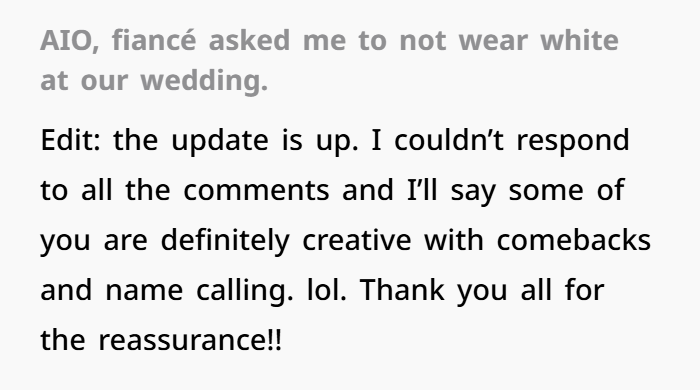



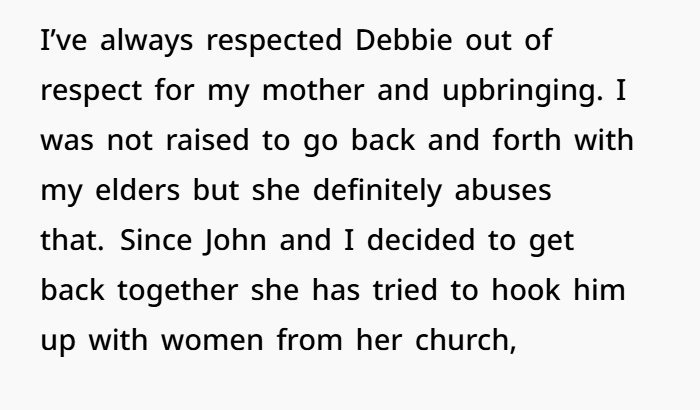


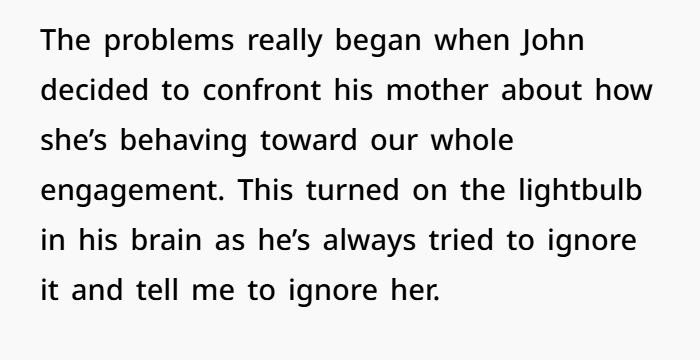
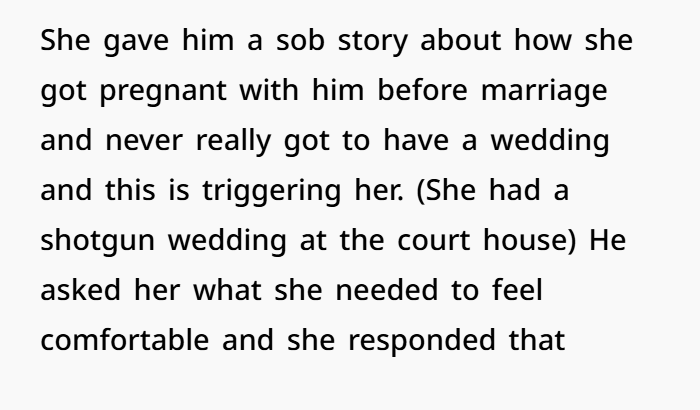
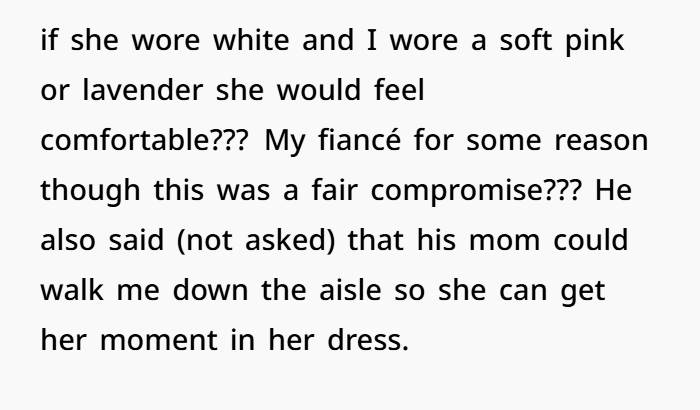
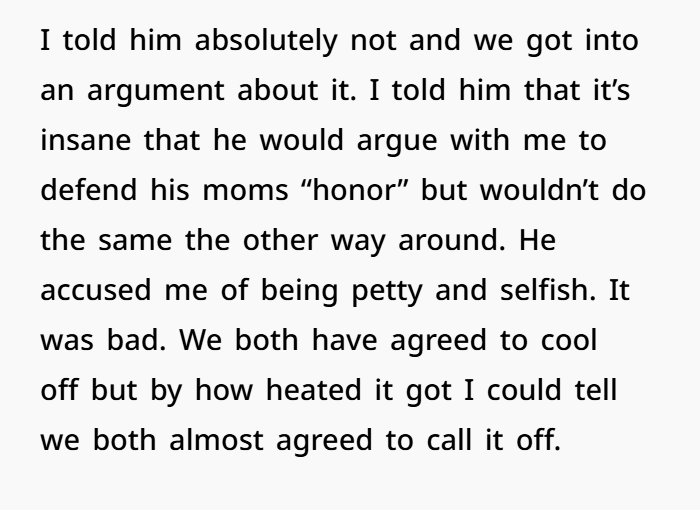


When Family Drama Threatens Your Relationship
1. The Role of Boundaries in Healthy Relationships
While strong, healthy relationships require setting and respecting boundaries. In this example, moms choosing colors for the bride’s dress and walking the bride down the aisle is obviously over the line. Not just requesting special favors; it is trying to commandeer an important time that is meant to highlight the couple.
It can be very demanding if the interference from parents at the back of your head remains unresolved, as highlighted by Psychologists from Psychology Today that states unreasonable parental interference, particularly in romantic relationships, is ultimately a strain. When one partner continually puts the feelings of a parent before that of his or her spouse, it shows an imbalance that can jeopardize trust and emotional safety.
2. “Momma’s Boy” Dynamics: Why It’s Hard to Break Free
Debbie’s behavior is a classic illustration of emotional enmeshment, wherein a parent excessively dominates the life of their adult child. As we see on shows like I Love a Mama’s Boy, these dynamics create tension when a partner feels eclipsed—or even sidelined—by a mom. The fact that he makes no effort to stand up to his own mother indicates that he is still partly enmeshed with her.
The bride has a reason to be annoyed as he constantly brushes off Debbie’s behavior and how it affects him and the relationship. Indeed, when partners do not deal with toxic parental interference, it can result in mounting resentment and lack of communication, and even lead to a breakdown of a relationship, as a Harvard study of family dynamics notes.
3. Wedding Planning and Emotional Symbolism
White is not just a wedding tradition; for many brides, white on their wedding day represents happiness, party, and a new start. Redeeming such a loss from the bride for Debbie’s emotional well-being is not a mere “shade of color” — it is a power play, returning the wedding to the mother-in-law’s own universe of desire.
Then, he went on further to disrespectfully propose that his MOM walks the bride down the aisle. The walk down the aisle is so personal — she’s a bride who someone important must really love to receive this gift. By pushing Debbie into this position, it disrespects what the bride, and in turn, the ceremony itself, represents.
4. Red Flags That Can’t Be Ignored
This incident isn’t just about wedding colors—it’s a symptom of larger issues within the relationship. A few key red flags include:
- The Fiancé’s Lack of Advocacy: His unwillingness to firmly address his mother’s behavior shows a lack of prioritization for the bride’s needs.
- Debbie’s Manipulative Behavior: From meddling in their dating life to demanding control over the wedding, her actions reflect an ongoing pattern of disrespect.
- Communication Breakdown: The argument about the wedding suggests unresolved tension that could resurface in future conflicts.
These behaviors raise serious questions about the couple’s long-term compatibility. Without intervention, the dynamic is unlikely to improve post-wedding.
5. What Are the Options?
For the bride, it’s crucial to decide whether this is a battle worth fighting—or if it’s indicative of deeper issues that may require professional help. Here are some potential paths forward:
- Couples Counseling: A neutral third party can help the couple address these dynamics, set boundaries with Debbie, and improve communication.
- Reassessing Priorities: The bride should reflect on whether this relationship aligns with her long-term vision for partnership and family dynamics.
- Taking a Stand: If the fiancé cannot support her on such a significant issue, it may be time to consider postponing or calling off the wedding.
Readers were quick to call out their concerns, and the bride joined in on the conversation to share more details
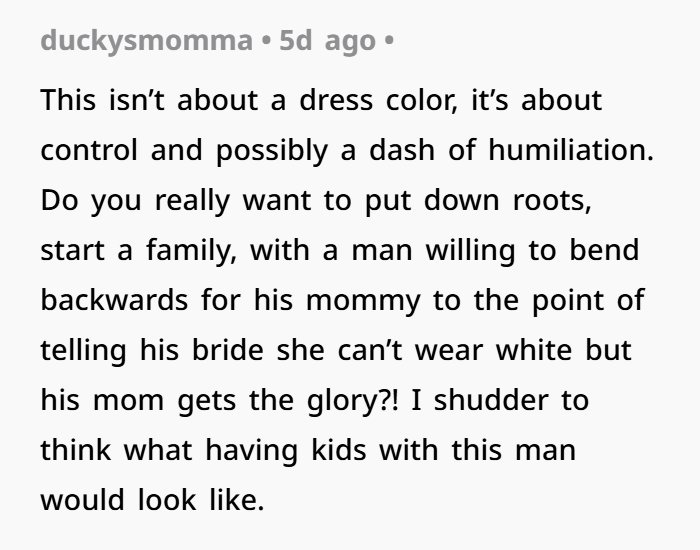

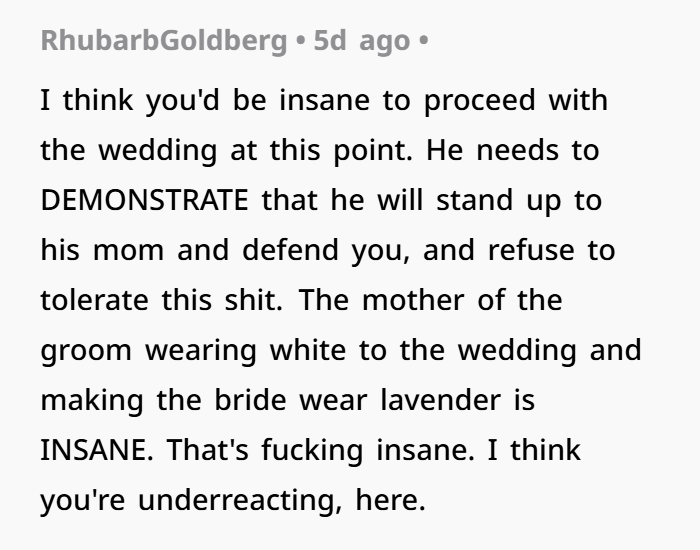

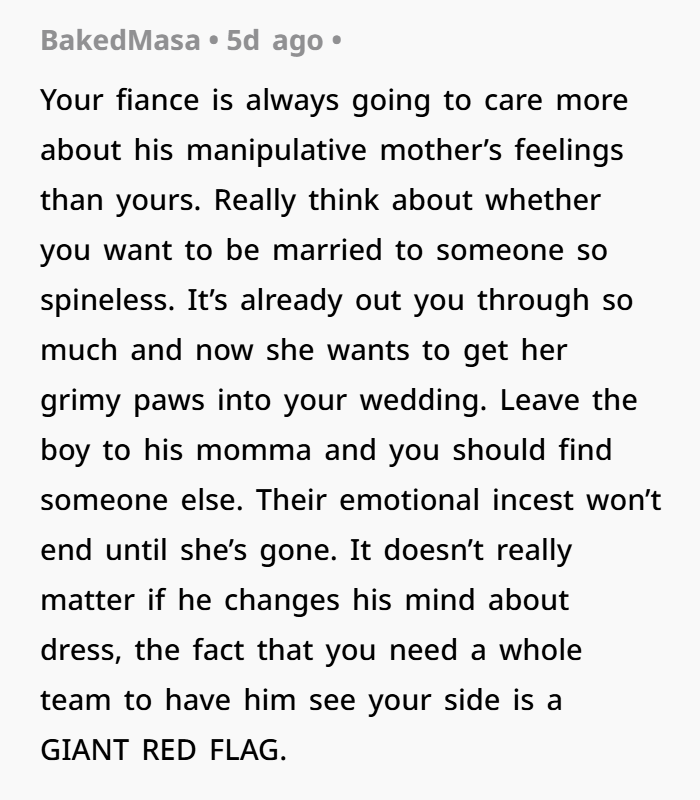

It is more than a wedding dress; it is about respect, boundaries, and the foundation of a healthy marriage. Letting her dictate the important details of the wedding will only pave the way for beyond trodden paths. Now, compromise is a necessary evil in every relationship, but you should not have to sacrifice your values and happiness just to make a controlling family member happy. In the case of this bride, the issue is not if she will wear white—its if she and this man have mutual respect and support to make it together forever.

